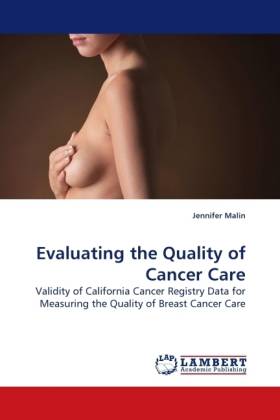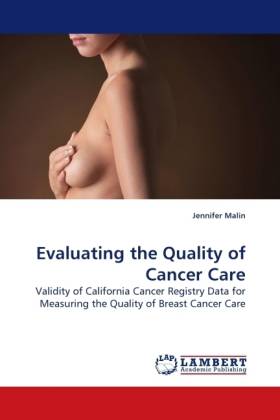
Bedankt voor het vertrouwen het afgelopen jaar! Om jou te bedanken bieden we GRATIS verzending (in België) aan op alles gedurende de hele maand januari.
- Afhalen na 1 uur in een winkel met voorraad
- In januari gratis thuislevering in België
- Ruim aanbod met 7 miljoen producten
Bedankt voor het vertrouwen het afgelopen jaar! Om jou te bedanken bieden we GRATIS verzending (in België) aan op alles gedurende de hele maand januari.
- Afhalen na 1 uur in een winkel met voorraad
- In januari gratis thuislevering in België
- Ruim aanbod met 7 miljoen producten
Zoeken
Evaluating the Quality of Cancer Care
Validity of California Cancer Registry Data for Measuring the Quality of Breast Cancer Care
Jennifer Malin
Paperback | Engels
€ 48,45
+ 96 punten
Omschrijving
Policy makers, professional organizations, and patient advocates have called for systems to monitor the quality of cancer care. Cancer registries identify all patients diagnosed with cancer and collect information about their initial treatment. However, registry data are less accurate for ambulatory-based services than hospital-based services than ambulatory services. The more remote from the diagnostic hospital procedure, in both space and time, the less likely the registry is to have the information about the treatment. Cancer registries are uniquely situated to identify a population-based sample of cancer patients and remain the best candidate to provide the infrastructure for measuring the quality of cancer care. A significant investment should be made to augment their data collection efforts so that they can reliably document cancer care delivered in the ambulatory setting.
Specificaties
Betrokkenen
- Auteur(s):
- Uitgeverij:
Inhoud
- Aantal bladzijden:
- 116
- Taal:
- Engels
Eigenschappen
- Productcode (EAN):
- 9783838324173
- Uitvoering:
- Paperback

Alleen bij Standaard Boekhandel
+ 96 punten op je klantenkaart van Standaard Boekhandel
Beoordelingen
We publiceren alleen reviews die voldoen aan de voorwaarden voor reviews. Bekijk onze voorwaarden voor reviews.









